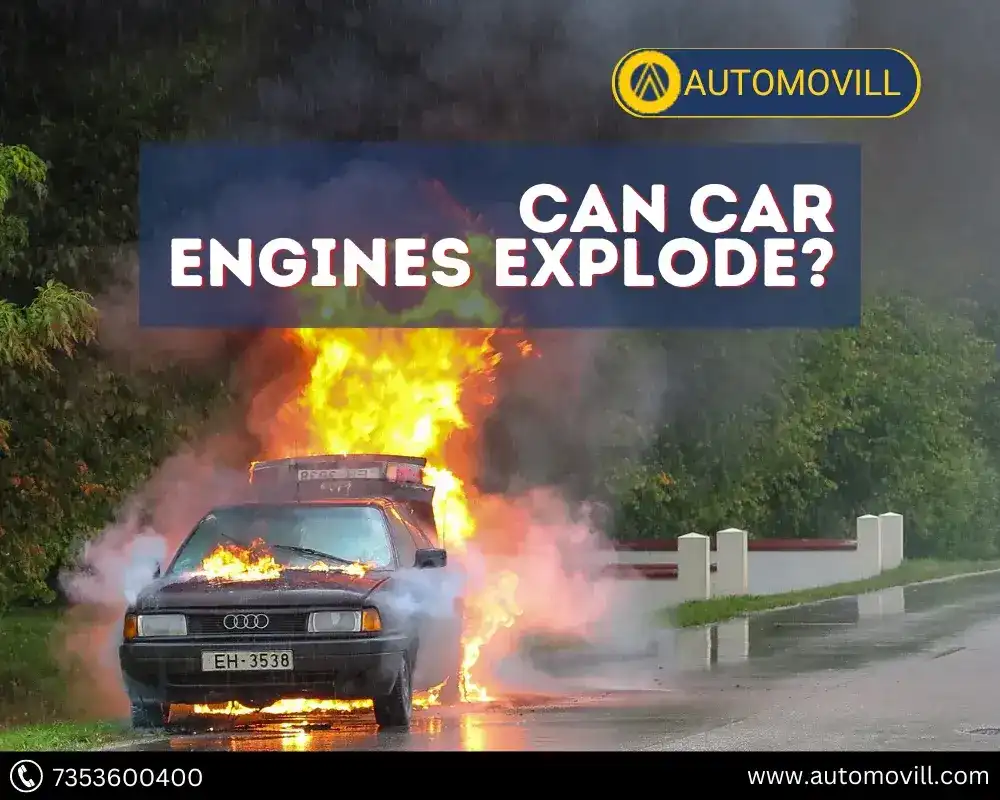
While operating a vehicle is undoubtedly enjoyable for all parties involved, there are numerous restrictions, such as the need to maintain the engine properly to prevent unfavourable situations like a fire.
Can a car engine explode when it catches fire? You may be wondering.
It is quite unlikely that car engines will blow up because liquid petrol doesn’t actually burn; only its fumes do. A large amount of gas must be evaporated and ignited in order to generate an explosion.
However, an automobile engine can catch fire as a result of an accident, rollover, mechanical or electrical failure, etc.
I’m going to explain why a car engine won’t blow up, why it catches fire, and how you should maintain this car to prevent any unfavourable events in this article.
Why Cars won’t explode?
The gallons of highly combustible liquid that fuel your petrol car are what allow it to move. What prevents this fuel from malfunctioning and igniting the entire apparatus, you might be wondering?
Fuel comes in a variety of forms, such as petrol, diesel, and kerosene. Although not all of them are flammable, diesel fuel is substantially more flammable than petrol. There are two types of diesel fuel: one is flammable and the other is for combustion.
It takes lighting a match and throwing it into the pool of petrol fuel to start a fire because petrol is not itself flammable. Petrol produces a heavy, long-distance vapour with a high density that is heavier than air.
The internal combustion engine of a car prevents an explosion since it is built with stringent safety standards and all combustion takes place inside the engine.
You need an appropriate combination of air, fuel, and heat to ignite gasoline. The fuel system of a car keeps the gasoline and air apart. Sparks are still required for a fire to start even in the event that the fuel system malfunctions and gasoline vaporises.
Diesel, on the other hand, cannot be ignited with a spark of fire since it is heavier and oilier than petrol.
The vehicle’s engine won’t blow up. However, for a variety of reasons, they can easily catch fire:
1) Engine overheating: It is a frequent problem that results from faulty cooling systems, broken water pumps, malfunctioning radiator fans, etc.
Your engine is overheating mostly as a result of the cooling system’s failure to adequately cool the engine.
In addition to steam rising from the car hood and a weird odour in the engine compartment, your dashboard metre gauge will display an overheat warning when your engine is overheating.
2) Lack of oil: It causes the engine to seize owing to lack of lubrication, and high speed/overload situations can lead to mechanical pieces breaking through the cylinder block and igniting, which can result in an explosion.
The oil warning lamp in the instrument cluster is typically activated when engine oil leaks through any lubrication system components. Engine damage or seizure results from the motorist disobeying the Oil warning lamp and continuing to drive.
Engines that employ adulterated gasoline frequently detonate before they ignite, resulting in an explosion.
Pre-ignition most frequently occurs when
- When low-quality fuel is used, the engine’s needed Octane number is not met.
- incorrect fuel is used
- Detonation can occur when certain additives intended to boost power performance are not appropriate for the engine.
3) When foreign particles enter the engine chamber
- Sand is forced into the engine combustion chamber as a result of an air filter malfunction, such as the use of a subpar or false filter element.
- Due to fine sand particles that can’t be filtered through the air filter, sand is pumped into the engine chamber.
- Tricky circumstances like a third party placing sand in the engine or fuel tank, etc.
Sand gets poured into the cylinder and abrades the piston when it or other foreign particles enter the engine’s lubricating chamber. Additionally, engine bearings that were used for a long time before the flaw was discovered were seized. It frequently results in an engine exploding under particular circumstances.
Here we have described the scenarios in which an explosion can happen, particularly when the engine overheats or if the machine is devoid of coolant or oil. These situations are the most typical ones that lead to engine misbehaviour. The engine first makes loud knocking and detonating noises, which might eventually cause wear and tear on the parts or an explosion.
FAQs
1) Can an engine in an electric car explode?
Yes, a crash or overcharging of the batteries can cause an electric car’s engine to catch fire or explode. However, electric vehicles have efficient cooling systems that guard against any explosions.
The biggest problem is that because electric cars use lithium-ion batteries, which may burn for hours at a time, they are more difficult to put out if they catch fire.
2) What happens if your engine explodes?
Extremely hot, pressurised oil and smoke will spew out of the top of the engine as a result of the broken valve. This necessitates an entirely new engine. An expensive and frequently necessary engine replacement is a blown engine.
3) What does a blown engine sound like?
If there is a loud noise, your motor has likely blown. It can make a loud banging or pounding noise. It has also blown if the engine is fully seized up or you notice smoke coming from it.
